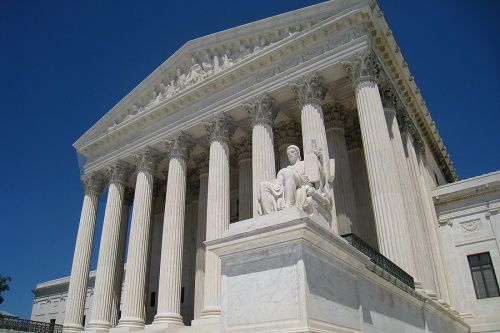The Supreme Court will hear legal challenges to the federal contraception mandate, brought by numerous non-profit groups, including the Little Sisters of the Poor. The court made its announcement Nov. 6. It will take up seven cases representing numerous schools, dioceses, and charitable organizations. At the center of the controversy is a federal rule announced by the Obama administration that requires most employers to provide employee health care plans that cover birth control, sterilizations, and drugs that can cause early abortions. Employers that do not comply with the mandate may face crippling fines as a penalty. In the case of the Little Sisters — an order that cares for the elderly poor and dying — this could mean up $2.5 million per year in fines, or 40 percent of the annual amount they beg for. After the initial outcry that the rules violated the religious freedom of employers who conscientiously objected to providing such coverage, the administration announced revised guidelines in the form of a religious “accommodation.” Religious organizations and non-profits that opposed the mandate are instructed to sign a form directing the government to notify their insurer of their objection. The insurer will then have the burden of providing the coverage. While the government has argued that this coverage will ultimately be free because contraception provides “tremendous” health benefits and lowers costs that would otherwise arise from bearing children, critics contend that the costs of the coverage will still eventually be passed on to the objecting employers themselves. Many religiously-affiliated organizations — including employers, non-profits, hospitals, and universities — still objected to the revised guidelines. They said the rules still force them to cooperate in actions that they believe to be immoral. In total, more than 300 plaintiffs have filed lawsuits challenging the mandate. Lawyers for the U.S. Bishops Conference have argued that the revised guidelines still put a “substantial burden” on the beliefs of religious non-profits and closely-held businesses because they are required to hand the government “all it needs” to provide the objectionable coverage. Last July, the Little Sisters of the Poor lost their case against the mandate at the Tenth Circuit Court of Appeals. The court ruled that the “accommodation” offered by the administration to religious groups like the sisters did not put a “substantial burden” on their religious beliefs and relieves them “from complicity” in actions they find objectionable. The sisters applied for and received a temporary injunction from the mandate in August and appealed their case to the Supreme Court. During his visit to the U.S., Pope Francis made an unscheduled stop at the sisters’ Jeanne Jugen Residence in Washington, D.C. to show “support” for them in their case against the mandate, the director of the Holy See’s press office Fr. Federico Lombardi confirmed after the stop. The Supreme Court has already ruled once on the HHS mandate. In a case involving the family-owned craft chain Hobby Lobby, the court ruled in 2014 that they and similar “closely-held for-profit” businesses were exempt from the mandate. For-profit companies that objected to the mandate had not been offered the “accommodation” given to religious non-profits. The Green family, which owns the chain, had conscientiously objected to providing employees coverage for drugs they believed could cause abortions. In that decision, Hobby Lobby v. Burwell, the court ruled that the mandate violated the Religious Freedom Restoration Act when applied to a closely-held for-profit corporation like Hobby Lobby. Now, the Supreme Court will consider the mandate as it applies to non-profit groups. While the case involves the plaintiffs who challenges to the mandate have already received a ruling at the federal appeals level, the decision could also apply to the plaintiffs who are still at a lower level of the court process. A ruling is expected sometime next year.

